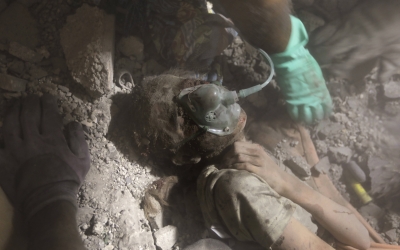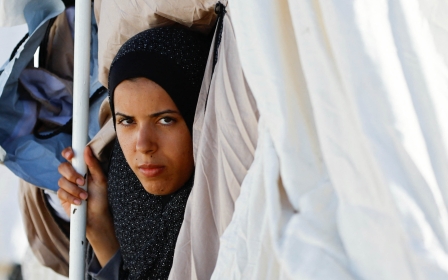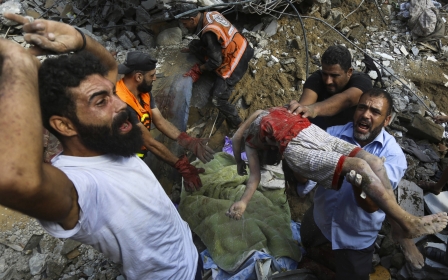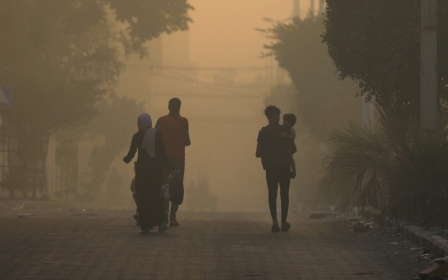Israel-Palestine war: The harsh reality of disabled people trying to survive war
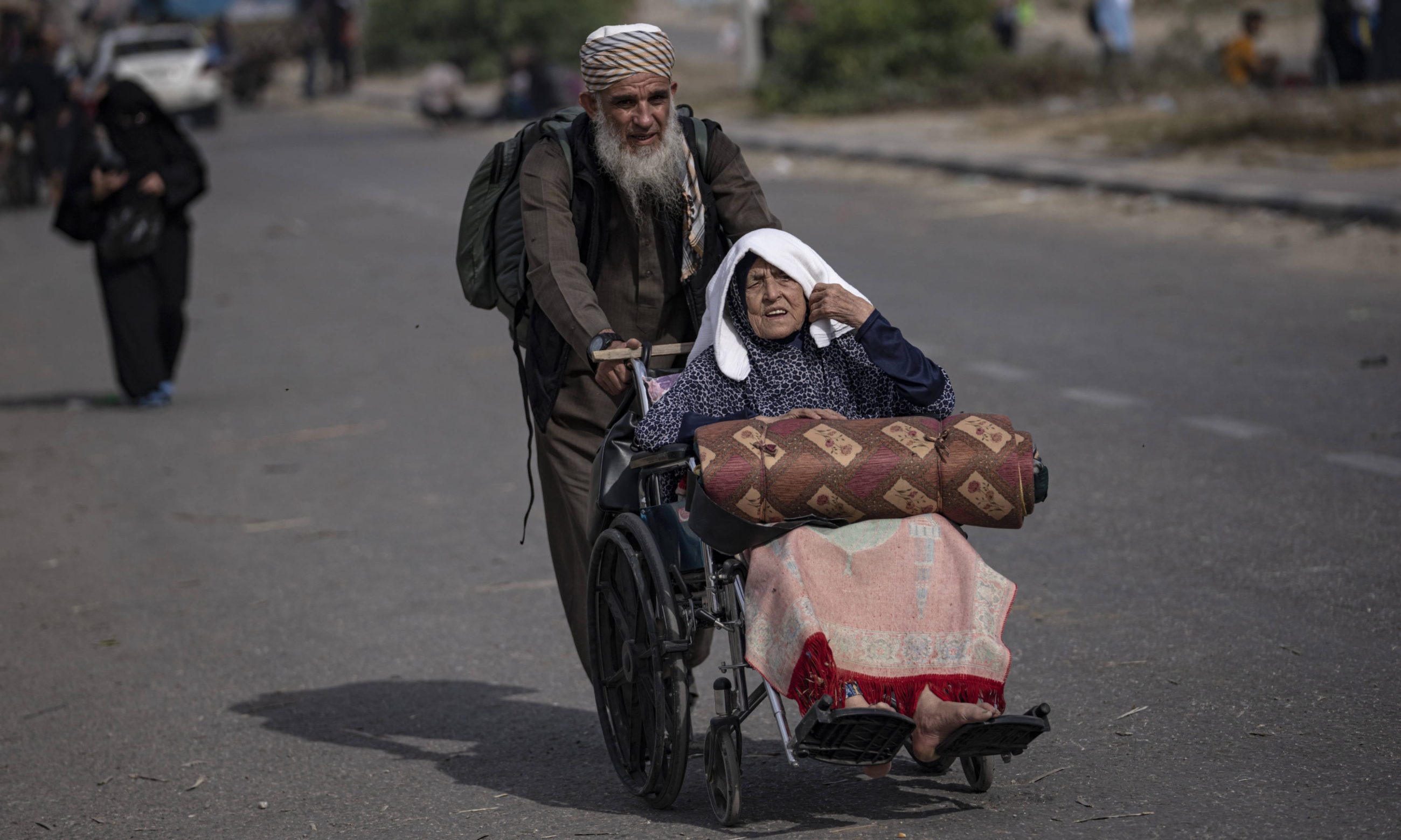
For nearly seven kilometres, Rewaa Moeen had carried her six-year-old paralysed brother Ahmed on foot, fighting exhaustion and an intense fear that she and her family could be bombed at any moment before they reach the southern areas of the Gaza Strip.
But the long journey to "safety" has been made even more arduous by the rubble of flattened buildings for the hundreds of thousands of people who had been ordered by the Israeli military to move to the south of the blockaded strip, using a so-called "safe corridor" while only carrying their ID cards with them.
Knowing that they could not take anything, Moeen's family did not risk taking Ahmed's wheelchair, fearing that he might be targeted.
"At the beginning of the war when many families evacuated their homes, we refused to evacuate and head to the south. Part of the reason was that moving my brother is not easy, he needs a special environment and a place to be able to do his daily activities easily," Moeen, 27, told Middle East Eye.
New MEE newsletter: Jerusalem Dispatch
Sign up to get the latest insights and analysis on Israel-Palestine, alongside Turkey Unpacked and other MEE newsletters
But on 8 November, as Israeli tanks approached their neighbourhood in west Gaza City, and amid intensified bombing in the area, the family made the difficult decision of leaving their home.
"We were hesitant about taking Ahmed's wheelchair, especially after we read the news and heard from people who previously crossed the corridor that the occupation forces did not allow them to carry anything with them, not bags, not official papers or gold, only an ID card that they needed to hold in their hands.
"The wheelchair will also not help when we walk on the rubble of demolished homes and buildings, sand, and many other obstacles."
Moeen's family decided to carry Ahmed along the way, but her elderly parents and two younger siblings could not carry him, so she took on the responsibility.
Follow Middle East Eye's live coverage of the Israel-Palestine war
"We took a taxi to a certain point where people were asked to gather in order to start walking on foot together to reach the south of the al-Wadi area [in the central Gaza Strip], then I had to carry Ahmed, " she said.
"I was nervous seeing the occupation soldiers and their tanks for the first time in my life, my parents were exhausted, and at some point, I was so tired that I could no longer walk, so my 15-year-old brother helped me and carried him several times, and we had to stop for a few moments multiple times although we were not allowed to."
'I feel helpless'
Ahmed, who could walk until the age of five, suffers from a muscle failure that eventually rendered him unable to walk without completely leaning on someone.
Due to the lack of medical treatment available in Gaza, his family had been planning to take him abroad for treatment prior to Israel's war.
Ahmed requires round-the-clock attention. He needs his family's help to move from one room to another, to go to the toilet, to take a bath and go to school.
'I wish we could bring him the wheelchair so that I could at least take him to any market near the house to make him feel that he is moving'
- Rewaa Moeen
But the situation has become increasingly difficult now that the family is staying with relatives in Nussairat, in the central Gaza Strip, with around 25 other people, making it very hard to move Ahmed around and take care of him.
"He is sitting almost all the time as the house is crowded, and this is affecting his mental well-being as well. He is getting depressed, especially that there are a lot of children here running and playing all the time while he is just sitting and watching them."
"My heart aches for him and I feel helpless towards his pain. I wish we could bring him the wheelchair so that I could at least take him to any market near the house to make him feel that he is moving."
Since they have evacuated their home, Moeen says her brother has gotten angry and has on multiple occasions refused to eat due to depression.
But the situation in the south is becoming increasingly uncertain, as the Israeli military is now warning people in southern Gaza to relocate as it turns its war efforts to the area after depopulating the north.
Hundreds of thousands of Palestinians who had fled south at its orders are now at risk of being displaced once again.
'Isolated and abandoned'
In the Zawaida area of the central Gaza Strip, around four kilometres from where Moeen's family is staying, 59-year old Nabeel Abu Jubein* sits in his wheelchair listening to the local radio in the yard of the house where he, his wife, his son and his grandchildren are sheltering.
His family had managed to bring him the wheelchair as they evacuated their home on 13 October, before the Israeli incursion into the Gaza Strip and the opening of the safe corridor.
The grandfather, who is also blind as a result of severe diabetes, feels isolated despite having his family around him.
"If an air strike targets the house or the neighbourhood, I cannot move, not even using the wheelchair. I am completely paralysed, I cannot see and I can barely hear and move my arms. What has helped me is that we evacuated by car when the situation was less dangerous," Abujubein told MEE.
"I know my son would not hesitate to carry me, but I would not feel comfortable having him carry me when he needs to help his wife carry their three children.
"My feeling of disability doubles when I realise that I am a burden on my family."
Of the Gaza Strip's nearly 2.3 million residents, there are around 1.5 million displaced people with very limited access to relevant healthcare services.
As the escalation of the Israeli incursion and bombardment of Gaza impacts the entire population, their feeling of disability and abandonment doubles.
"What did the world that has long talked about human rights and the rights of people with disabilities do for us? My granddaughter has a subject about human rights in school. The first time they learned about people with disabilities, she was happy that she could reflect on me," Abu Jubein laughed.
'My feeling of disability doubles when I realise that I am a burden on my family'
- Nabeel Abu Jubein
"She came to me repeating what she had learned about their rights and how they should be given a special treatment.
"Now where is this special treatment? Did the world at least call for the evacuation of the displaced from Gaza until the end if the attacks?
"Even hospitals are targeted. When the Israeli occupation started bombing hospitals and then besieged al-Shifa Hospital, we thought that this would be the start of an international revolution against the occupation, because the protection of patients and children inside hospitals is the core value of human rights.
"But, surprisingly, nothing happened."
Middle East Eye delivers independent and unrivalled coverage and analysis of the Middle East, North Africa and beyond. To learn more about republishing this content and the associated fees, please fill out this form. More about MEE can be found here.


